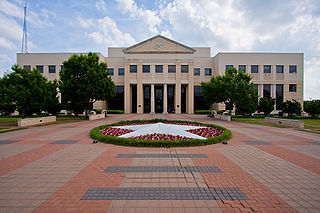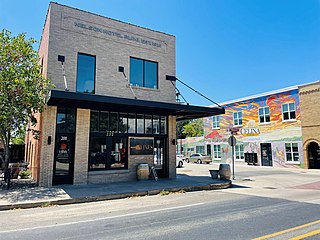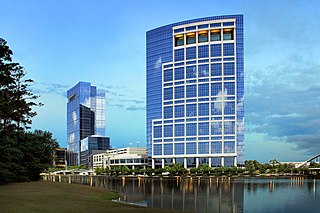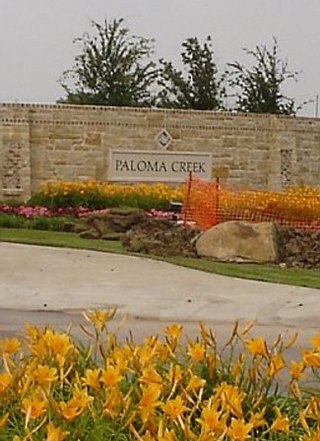Related Research Articles

Denton County is located in the U.S. state of Texas. As of the 2020 census, its population was 906,422, making it the seventh-most populous county in Texas. The county seat is Denton. The county, which was named for John B. Denton, was established in 1846. Denton County constitutes part of the Dallas–Fort Worth metroplex. In 2007, it was one of the fastest-growing counties in the United States.

Collin County is located in the U.S. state of Texas. It is part of the Dallas-Fort Worth-Arlington metropolitan statistical area, and a small portion of the city of Dallas is in the county. At the 2020 United States census, the county's population is 1,064,465, making it the sixth-most populous county in Texas and the 43rd-largest county by population in the United States. Its county seat is McKinney.

Celina is a city in Collin and Denton counties in the U.S. state of Texas. Celina is part of the Dallas–Fort Worth metroplex.

Prosper is a town in Collin and Denton counties in the U.S. state of Texas. Prosper is located within the Dallas-Fort Worth-Arlington metropolitan area. As of the 2010 census, its population was 9,423; As of 2023, the population was 37,746.

Denton is a city in and the county seat of Denton County, Texas, United States. With a population of 139,869 as of 2020, it is the 27th-most populous city in Texas, the 197th-most populous city in the United States, and the 12th-most populous city in the Dallas–Fort Worth metroplex.

Lincoln Park was a town in Denton County, Texas, United States. The population was 308 at the 2010 census.

The Colony is a city in Denton County, Texas, United States, and a suburb of Dallas. The population was 44,534 at the 2020 census.

Spring is a census-designated place (CDP) within the extraterritorial jurisdiction of Houston in Harris County, Texas, United States, part of the Houston–The Woodlands–Sugar Land metropolitan area. The population was 62,559 at the 2020 census. While the name "Spring" is popularly applied to a large area of northern Harris County and a smaller area of southern Montgomery County, the original town of Spring, now known as Old Town Spring, is located at the intersection of Spring-Cypress and Hardy roads and encompasses a relatively small area of perhaps 1 square kilometer (0.39 sq mi).

The Woodlands is a special-purpose district and census-designated place (CDP) in the U.S. state of Texas in the Houston–The Woodlands–Sugar Land metropolitan statistical area. The Woodlands is primarily located in Montgomery County, with portions extending into Harris County. The Woodlands is governed by The Woodlands Township, an organization that provides municipal services and is administered by an elected board of directors. As of the 2020 U.S. Census, the township had a population of 114,436 people.

Lewisville is a city in the U.S. state of Texas, predominantly within Denton County with a small part lying within Dallas County. As a suburban community within the Dallas–Fort Worth metroplex, the 2020 census tabulated a population of 111,822.

Flower Mound is an incorporated town located in Denton and Tarrant counties in the U.S. state of Texas. Located northwest of Dallas and northeast of Fort Worth adjacent to Grapevine Lake, the town derives its name from a prominent 12.5-acre (5.1 ha) mound located in the center of town.

Southlake is a city located predominantly in Tarrant County with minor areas extending into Denton County in the U.S. state of Texas. Southlake is a suburb of Dallas/Fort Worth. As of the 2019 census estimate it had a population of 32,376.

Kingwood is a 14,000-acre (57 km2) master-planned community located in northeast Houston, Texas, United States. The majority of the community is located in Harris County with a small portion in Montgomery County. Known as the "Livable Forest," it is the largest master-planned community in Harris County and second-largest within the 10-county Houston-The Woodlands-Sugar Land metropolitan area. It was classified as a "census-designated place" during the 1990 census, when the population recorded was 37,397. It is on the east fork of the San Jacinto River.

Second Ward is a historical political district ward in the East End community in Houston, Texas. It was one of the four original wards of the city in the nineteenth century. The community known as the Second Ward today is roughly bounded by Buffalo Bayou to the north, Lockwood Avenue to the east, and railroad tracks to the south and west, although the City of Houston's "Super Neighborhood" program includes a section east of Lockwood.

Third Ward is an area of Houston, Texas, United States, that evolved from one of the six historic wards of the same name. It is located in the southeast Houston management district.

Fourth Ward is one of the historic six wards of Houston, Texas, United States. The Fourth Ward is located inside the 610 Loop directly west of and adjacent to Downtown Houston. The Fourth Ward is the site of Freedmen's Town, which was a post-U.S. Civil War community of African-Americans.
Riverside Terrace is a neighborhood in Houston, Texas, United States. It is along Texas State Highway 288 and north of the Texas Medical Center and located near Texas Southern University and University of Houston. There about 20 sections of Riverside Terrace that span across North and South MacGregor. The community, formerly an affluent Jewish neighborhood, became an affluent community for African Americans in the 1950s and '60s. It is still predominantly African American neighborhood with different income levels. It has been undergoing a gradual change in demographics and aesthetics due to gentrification efforts since the early 2000s.

Paloma Creek is a master-planned community in northeastern Denton County, Texas, United States. The community is listed by the U.S. Census Bureau as two separate census-designated places, "Paloma Creek" and "Paloma Creek South", separated by U.S. Highway 380. As of the 2010 census, the Paloma Creek CDP had a population of 2,501, while Paloma Creek South had a population of 2,753. As of 2022, the HOA currently estimates the population to be approximately 20,000.
Providence Village is a new town in Denton County, Texas, United States. Composed largely of a master-planned community, it includes approximately 1,700 homes and 5,750 people. At the time of the 2010 census, the town had not yet incorporated, and was instead listed by the U.S. Census Bureau as the "Providence" census-designated place, with a population of 4,786.
References
- ↑ Odintz, Mark. "Quakertown, TX". Texas State Historical Association. Retrieved 19 June 2021.
- ↑ "Remembering Quakertown: A Look Into The Community That Once Was". Denton County Office of History and Culture: Blog. Retrieved 20 June 2021.
- ↑ Douglas, Lara. "QUAKERTOWN" (PDF). Denton County. Denton County. Retrieved 20 June 2021.
- ↑ "Remembering Quakertown: A Look Into The Community That Once Was". Denton County Office of History and Culture: Blog. Retrieved 20 June 2021.
- ↑ Douglas, Lara. "QUAKERTOWN" (PDF). Denton County. Denton County. Retrieved 20 June 2021.
- ↑ McDonough, Timothy. "The Ghosts of Quakertown" . Retrieved 20 June 2021.
- ↑ Douglas, Lara. "QUAKERTOWN" (PDF). Denton County. Denton County. Retrieved 20 June 2021.
- ↑ Douglas, Lara. "QUAKERTOWN" (PDF). Denton County. Denton County. Retrieved 20 June 2021.
- ↑ Douglas, Lara. "QUAKERTOWN" (PDF). Denton County. Denton County. Retrieved 20 June 2021.
- ↑ Douglas, Lara. "QUAKERTOWN" (PDF). Denton County. Denton County. Retrieved 20 June 2021.
- ↑ Brown, L. (October 9, 2006). "Park Proposal Aims to Make Amends". Denton Record-Chronicle.
- ↑ McGraw, D. X. (February 15, 2008). "Once-Lost History Celebrated". Denton Record-Chronicle.